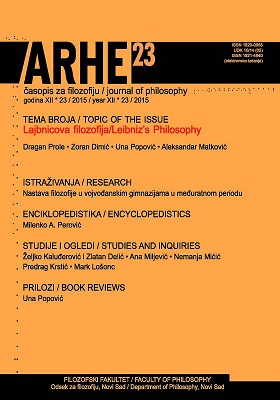Lajbnicov pojam nauke – početak i kraj optimizma
Leibniz’s Notion of Science – The Beginning and the End of the Optimism
Author(s): Zoran DimićSubject(s): Epistemology, Logic, Early Modern Philosophy, Analytic Philosophy, Philosophy of Science
Published by: Филозофски факултет, Универзитет у Новом Саду
Keywords: Leibniz; Lisbon earthquake; science; mathematics; magnitude; prediction; optimism;
Summary/Abstract: One of the most important founders of the modern notion of science was Gottfried Wilhelm Leibniz. By his own determination of modern science, his name and his philosophy are linked in many ways to the famous catastrophe at the start of the modern epoch in Europe, namely the 1755 Lisbon earthquake. Leibniz’s ideal of science was expressed through the idea of mathesis universalis (universal mathematics). According to Leibniz’s interpretation, all things in nature should be understood and explained through size (magnitudo), form (figure) and motion (motus). We could say that according to this idea of modern science particular natural phenomena always need to be explained mathematically. Leibniz’s idea of science is the complete expression of the modern era. The mathematics should not only provide science with certainty (certitude) but our lives as well. Leibniz’s mathematical interpretation of natural phenomena takes us in this way to ”optimism” and the idea of the best of all possible worlds. Unfortunately Leibniz’s optimistic view of the world, which was generally typical for the end of the 17th and the beginning of the 18th century, was later dramatically interrupted by Lisbon earthquake. The ability to measure and compute the strength of the earthquake and the height of the tsunami did not bring tranquility and serenity to the souls of Portuguese and other Europeans. On the contrary, the computing knowledge of the 1755 Lisbon earthquake incorporated into their lives the enormous fear of recurrent catastrophe. The past catastrophe was regarded as a portent of the new catastrophe to come. Hence the author of this paper argues that it is not the 1755 Lisbon earthquake itself which marked the end of the optimism, but the modern notion of the science which brought the fear into the souls of the people by counting and predicting the probability of the new catastrophes.
Journal: Arhe
- Issue Year: 2015
- Issue No: 23
- Page Range: 35-46
- Page Count: 12
- Language: Serbian

